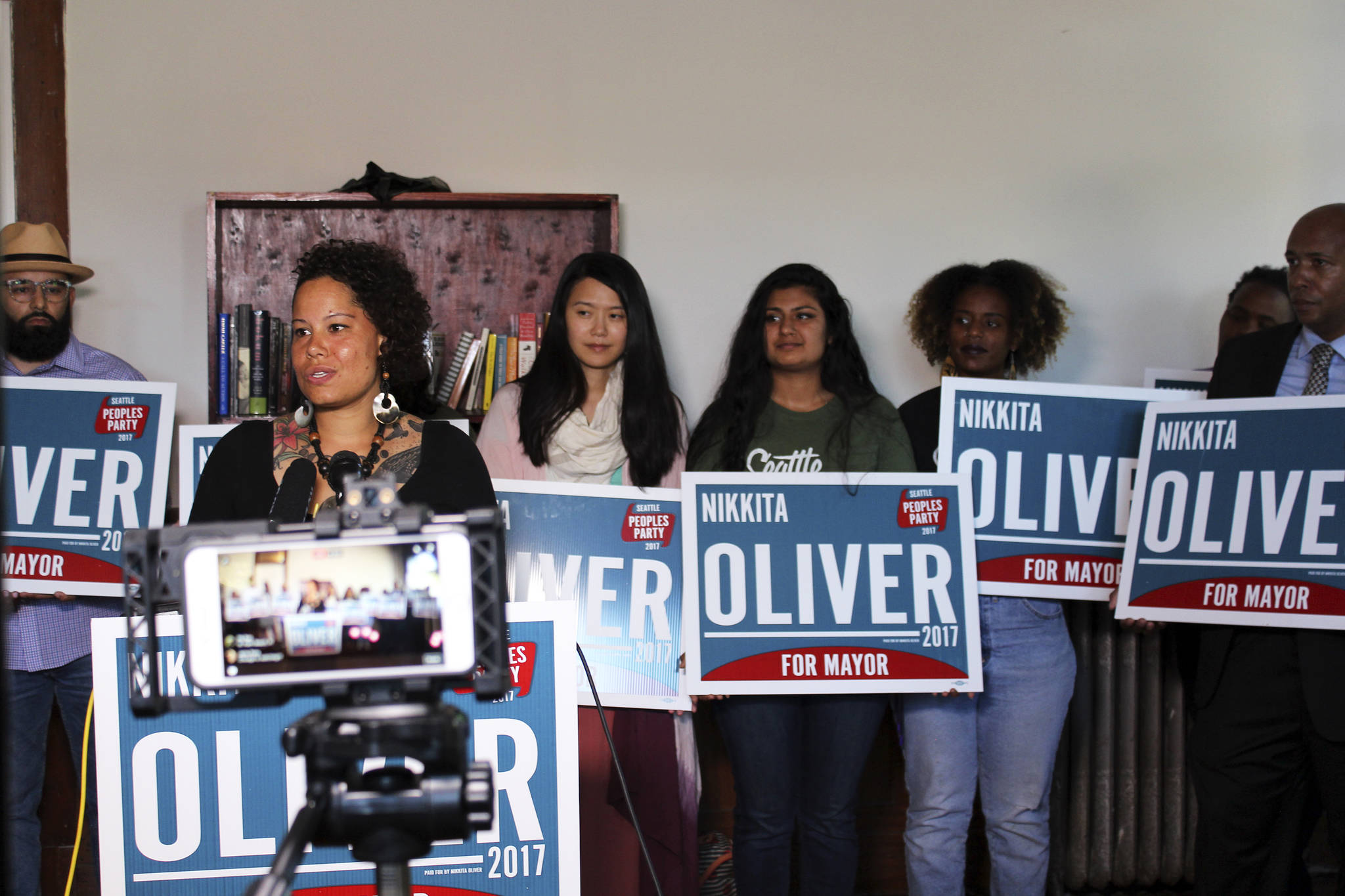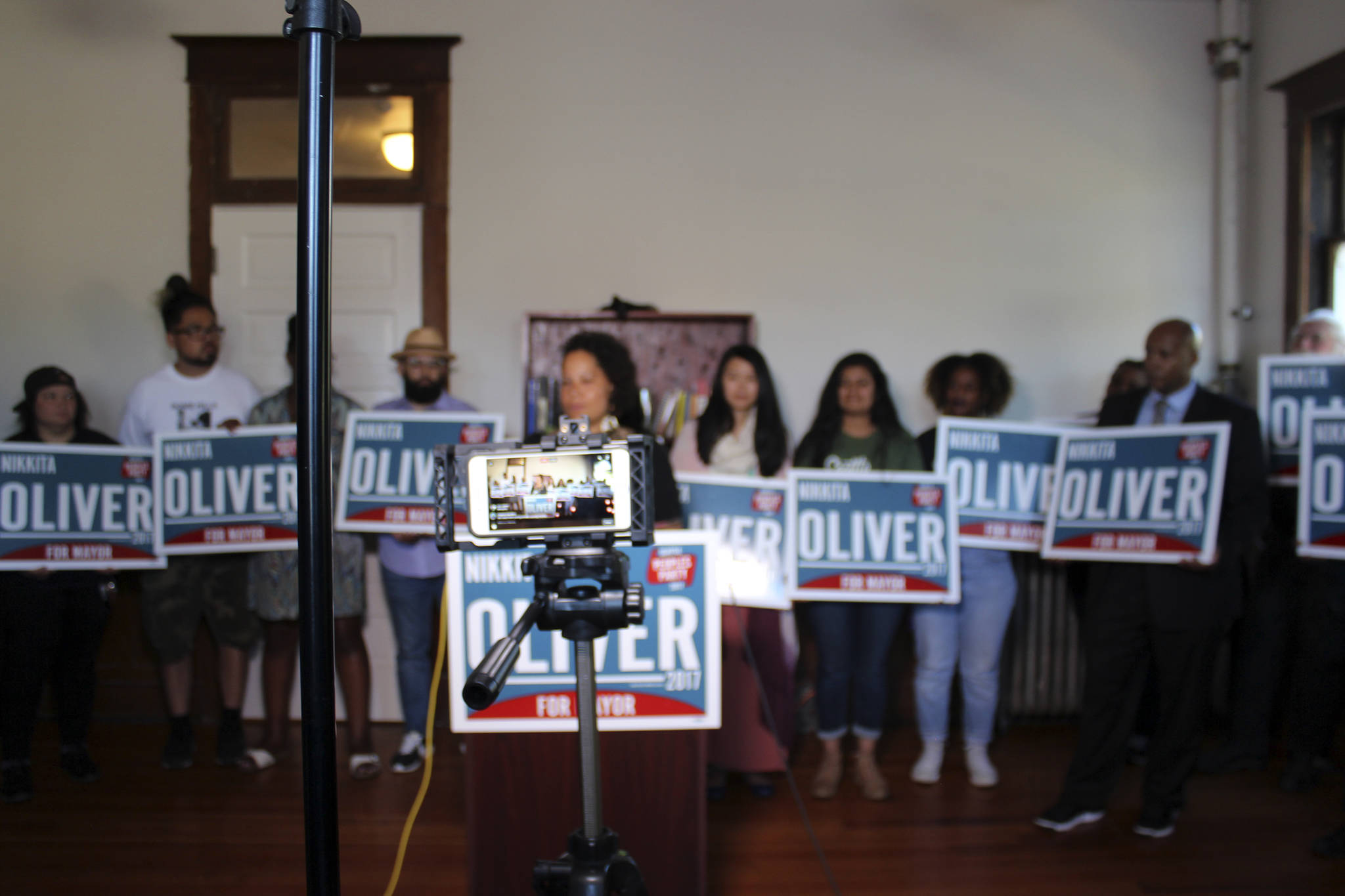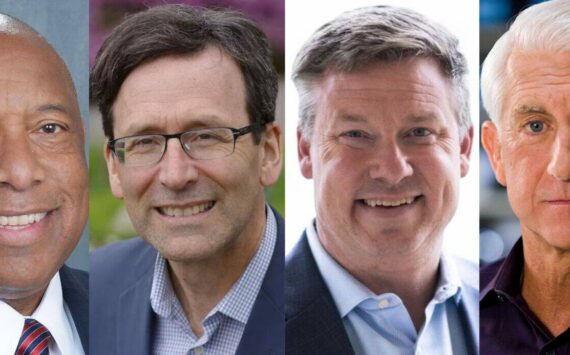Nikkita Oliver arrived at her own mayoral campaign launch party on April 2 a little bit late; she had been across town earlier that day, speaking at the Seattle Socialism Conference on the University of Washington campus.
When she arrived at Washington Hall in the Central District, she was surprised to see there were already hundreds of people standing in a long, snaking line that wrapped around the building, waiting to get in. And although music and speeches and performances lasted several hours, “Washington Hall stayed packed for the entire time,” she recalled in an interview with Seattle Weekly earlier today. “What I remember is at the end, when the Garfield [High School] drumline closed out the show, people lingered. People wanted to stay; they wanted to continue talking and building. And that for me was when I realized the power of the movement we were building: People are seeing themselves in our campaign.”
On Tuesday, the official ballot total from the August 1 primary was released, and the Nikkita Oliver campaign came to an end. Cary Moon will face off with Jenny Durkan in the general election, having defeated Oliver by 1,170 votes. “I am deeply honored by the support I received, and look forward to earning the support of all who want a City Hall of, by, and for the people,” said Moon in a statement.
A press conference Oliver held following the cerification of the final vote total, then, was technically a concession, but her campaign shaped it as a victory for the grassroots organizers who have coalesced under the banner of the newly-formed Seattle Peoples Party.
“It is said that when we organize, we win. What this campaign has shown is that when we organize, we thrive,” Oliver told a room full of reporters on Tuesday, flanked by a dozen core members of the Seattle Peoples Party, all holding NIKKITA OLIVER FOR MAYOR signs. “Thriving is what winning is.”
Added Edwin Lindo, one of the organizers with the Peoples Party: “This wasn’t just a campaign to win the election for mayor. This was a campaign to drastically transform a city.” When the Peoples Party formed in March, he said, it “was with one premise and one premise alone, and that premise was: ‘We are here to materially change the conditions of those that are underserved, that are marginalized, and have been relegated to the fringes of justice.’ We committed to that from day one.”
Moon took care to acknowledge the success of the movement in her statement, tipping her hat to Oliver and the Peoples Party, who, she said, “amplified the voices of those who often feel Seattle is no longer for them, and engaged thousands across Seattle in this important election. Our city is stronger for their work. I am inspired to hear the Peoples Party will continue to grow in power and engage in local politics.” Durkan did, too, in her ballot-certification statement: “Nikkita Oliver ran a great campaign. … There’s no doubt that she will be a leader for our city for years to come and that the issues she focused on will define our future.”
Oliver said that neither she nor the Peoples Party expect to endorse either candidate in the general election.
Instead, Oliver said that the Peoples Party will put all of its energy into a long list of goals and plans: It will continue to grow and formalize its ranks by hosting a general assembly in September and encouraging anyone to join in; it will keep pressure on the two mayoral candidates headed to the general election, in part by hosting a mayoral forum between Durkan and Moon, moderated by Oliver; it will continue to support efforts like I-940 (a campaign to change state law around the use of deadly force in policing) and against longstanding state law like I-200 (the 1998 initiative that prohibits affirmative action anywhere in the state). It will press City Hall on numerous issues, including police reform and the school-to-prison pipeline. It will also “absolutely,” Oliver told The Weekly, continue running political candidates. “We want to redistribute the knowledge of how to run for public office”—and not only the knowledge, but also the organizing body necessary to make it work. She credits her network of supporters for getting her as close as she got in this race.
“Without the network of folks that I have, this would have been impossible,” she said.
Oliver worked full-time during the five-month marathon while maintaining a schedule of forums, debates, town halls, and community barbecues. “If I’m honest,” she admitted, “it’s been grueling.” She said she would come home at 11:30 at night every day of the week so often that she had people helping her fold laundry and clean her car; there simply “wasn’t enough time to do regular life stuff.” At one point, she got bitten by a dog, and discovered how inadequate her health insurance plan was; her friends helped her care for the wound.
There were a lot of moments like this, she said. “I realized how impossible running for office is if you’re an everyday resident. For any of us who are working people, who have jobs, especially those of us who are renters, who maybe don’t have great health insurance—this is literally impossible without a network.” Then, she pointed out, without naming names, “There are people who can literally pay high-price consulting firms to run their campaign for them, who own their homes, who do have good health insurance—it does make all the difference in the world whether you can enter into public service.”
She mentioned this at the press conference, too, in a not-so-thinly-veiled jab at the Moon campaign: Moon was able to supplement her race with $90,000 of her own money. (She didn’t name Moon specifically, but “that $90,000, you know where it came from,” Oliver told reporters.) “I think it’s very notable,” she added, “that the two candidates in the general election are two wealthy white women who regularly in forums would say things like, ‘What Nikkita said, and…’”
Oliver told Seattle Weekly that that was a key challenge during the campaign. Other candidates often praised Oliver’s ideas, ideas that Oliver said “are birthed out of our lived experience” as people of color, as renters, as low-wage workers, but “these are not lived experiences these two candidates share.” She also pointed to a common practice on the campaign trail of her fellow candidates stressing how important it was to get more women of color into politics, but then still running against her, instead of alongside her. She decided not to broach the issue publicly, but said that she did speak one-on-one with a few candidates privately. “In those moments, I did have to say, ‘So you understand what you’re doing flies in the face of the equity you talk about?’ And every single one of them said, ‘Yes.’ In retrospect, I do think there are moments I wish I’d been a little more aggressive on that.”
In the end, though, Oliver said she feels inspired, motivated, energized, and not regretful at all. Despite tough odds and low expectations from pundits, especially at the very beginning of the race, “we were able to get 17 percent of the vote. We raised over $130,000. We have well over 1,100 volunteers. We knocked on 22,000 doors. We’ve done a lot, so there’s a lot to celebrate.”
And she said she feels her campaign has shifted things in people’s minds, too. She recounted another scene from her campaign’s primary election night party, also at Washington Hall: “A friend of mine came up to me and was telling me that her daughter said to her: ‘Mommy, are you gonna run for mayor next?’”
This, coming from “a young, black, mixed child.” Oliver said the story reminds her of “what it means to plant the seed, especially in young girls of color’s minds, that these roles are not outside of who we are, or who we are if we wanted to be. … ‘Nikkita ran for mayor. So can Mommy. So can auntie.’ That means a lot to me. Because that’s real transformation. You’ve not only begun transforming the system, but you’ve literally transformed someone’s thinking.”
sbernard@seattleweekly.com
This post has been updated to reflect the correct number of votes separating Oliver and Moon, and the date of the Peoples Party mayoral debate.









